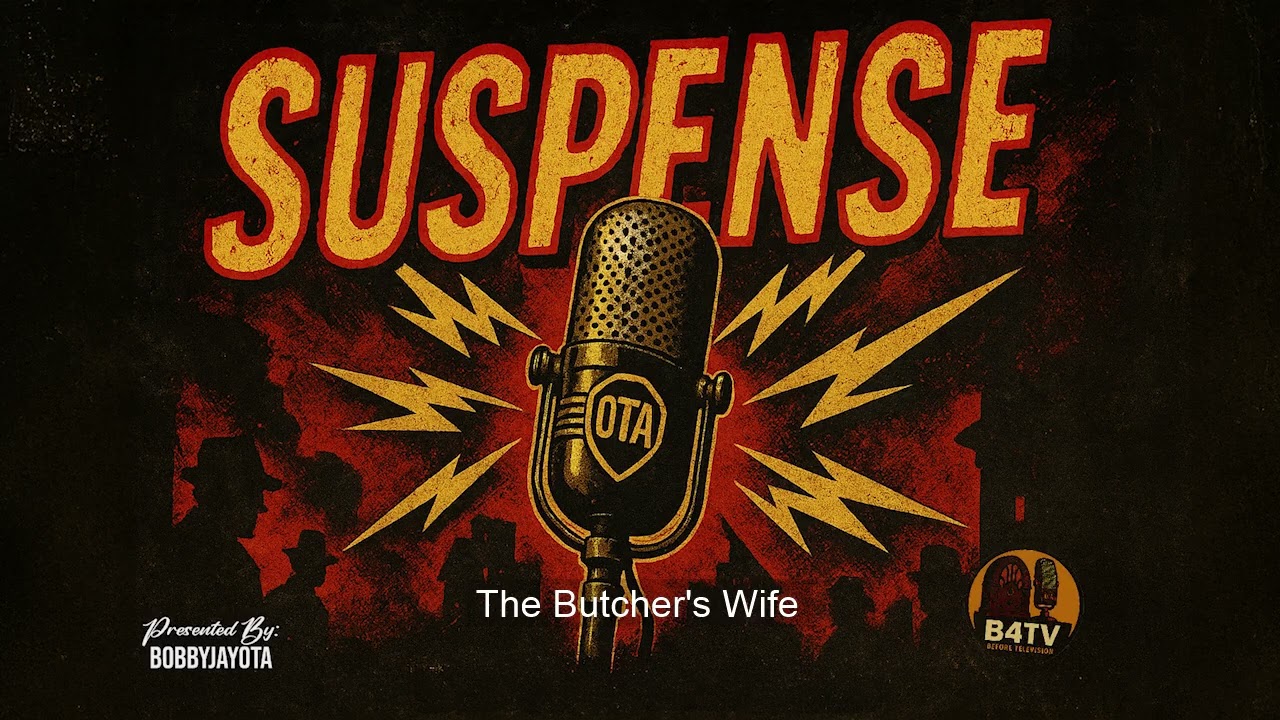Suspense – “The Butcher’s Wife” (Oct 21, 1943)
Suspense – “The Butcher’s Wife” (Oct 21, 1943)
Behind every quiet shop door, every friendly smile at the counter, there may lurk secrets darker than blood. In “The Butcher’s Wife,” the story opens on the seemingly ordinary life of a neighborhood butcher and his dutiful spouse. But as the tale unfolds, whispers of jealousy, greed, and betrayal cut sharper than any cleaver. When suspicion grows that the butcher’s knife has been put to use for more than trimming meat, the truth emerges in the most chilling way possible.
First broadcast October 21, 1943, this early Suspense episode embodies the program’s reputation for twisting the mundane into the macabre. A simple domestic setting — the family shop, the household routine — becomes the stage for a crime so intimate that listeners could imagine it happening next door.
The power of “The Butcher’s Wife” lies in its mix of psychological drama and stark violence. It draws on noir’s favorite theme: what happens when ordinary people let darker impulses take control. By the end, the “theatre of thrills” has turned the comfort of a kitchen into a place of terror.
Cast & Production
Produced by William Spier, who gave Suspense its edge in the early 1940s.
Music by Bernard Herrmann, whose cues made knives gleam and shadows stretch across the airwaves.
Starring Lillian Gish, silent film legend, whose performance gave the episode both pathos and bite.
Why It Matters
“The Butcher’s Wife” demonstrates Suspense’s range. It wasn’t just haunted houses or clever con games — it was about the rot that can set in behind familiar walls. By shining a spotlight on domestic unease, the episode struck nerves in wartime America, when trust and stability already felt fragile.
Bobby Jay’s Take
This one still cuts deep. What gets me is how Suspense shows us that monsters don’t always wear masks — sometimes they wear aprons. And the scariest thing? The butcher’s wife could have lived down your street.
Presented by OTA Music Group as part of B4TV: Before Television — preserving the theatre of the mind for a new generation of listeners.






![[ID: D09yfFMRJRk] Youtube Automatic](https://bobbyjay.com/wp-content/uploads/2025/10/id-d09yffmrjrk-youtube-automatic-236x133.jpg)
![[ID: bdJ3aeWk3NE] Youtube Automatic](https://bobbyjay.com/wp-content/uploads/2025/10/id-bdj3aewk3ne-youtube-automatic-236x133.jpg)
![[ID: pCd6I4BQJy4] Youtube Automatic](https://bobbyjay.com/wp-content/uploads/2025/10/id-pcd6i4bqjy4-youtube-automatic-236x133.jpg)
![[ID: 3nefxtz0LAQ] Youtube Automatic](https://bobbyjay.com/wp-content/uploads/2025/10/id-3nefxtz0laq-youtube-automatic-236x133.jpg)
![[ID: Ci0got7OjLI] Youtube Automatic](https://bobbyjay.com/wp-content/uploads/2025/10/id-ci0got7ojli-youtube-automatic-236x133.jpg)
![[ID: wm5PgoMU81s] Youtube Automatic](https://bobbyjay.com/wp-content/uploads/2025/10/id-wm5pgomu81s-youtube-automatic-236x133.jpg)
![[ID: ejdvDsEYaPc] Youtube Automatic](https://bobbyjay.com/wp-content/uploads/2025/10/id-ejdvdseyapc-youtube-automatic-236x133.jpg)
![[ID: bVyXH6YYa4U] Youtube Automatic](https://bobbyjay.com/wp-content/uploads/2025/10/id-bvyxh6yya4u-youtube-automatic-236x133.jpg)
![[ID: cEsvMZ4ywTE] Youtube Automatic](https://bobbyjay.com/wp-content/uploads/2025/10/id-cesvmz4ywte-youtube-automatic-236x133.jpg)